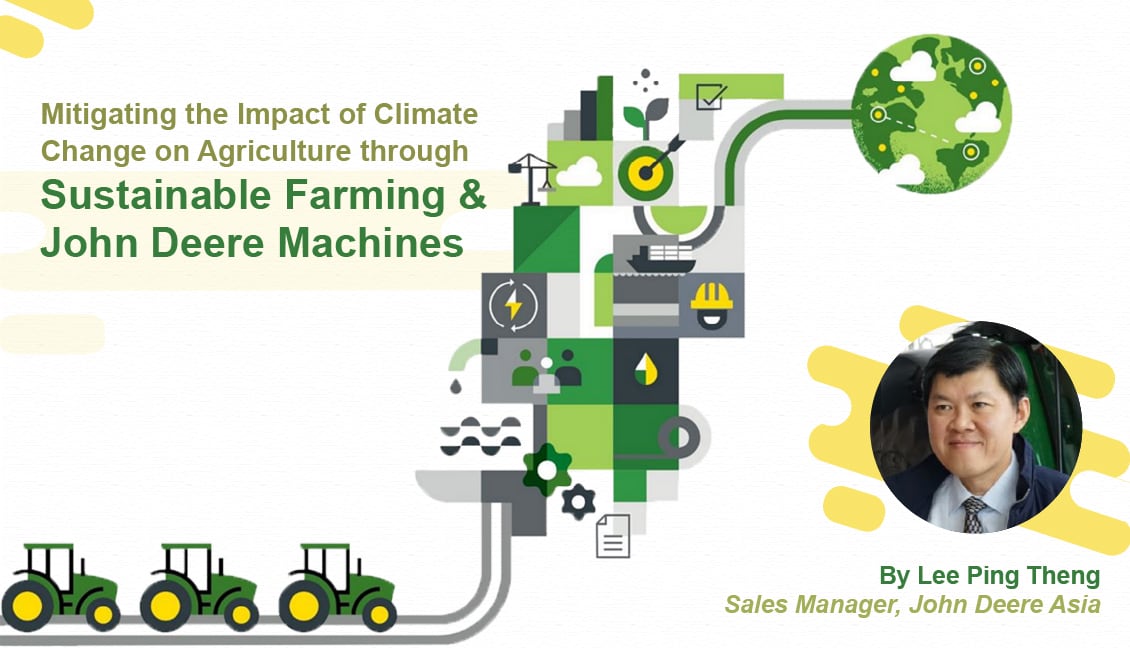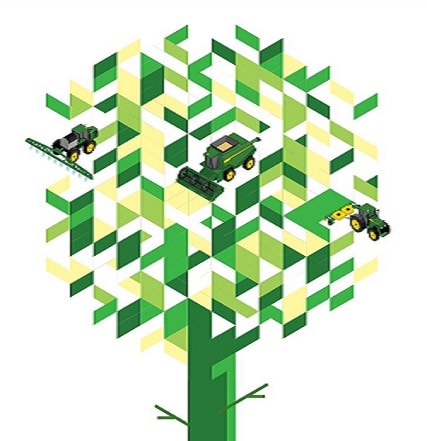By Lee Ping Theng | Sales Manager, John Deere Asia
September 11, 2023
[John Deere 2022 Sustainability Report] Mitigating the Impact of Climate Change on Agriculture

The world’s largest and most populous continent is grappling with the deadly effects of extreme summers coupled with torrential monsoon rains and flash floods which recently inundated parts of China, Japan, South Korea and India. While several individuals lost their lives, thousands of others were forced to evacuate their homes and seek temporary shelters owing to such extreme weather conditions. And well, what this signifies is that climate change is for real, and this looming challenge indeed poses a very serious threat. It is high time now that we acknowledge and take proactive measures to mitigate the adverse consequences of climate change.
Negative Effects of Climate Change in APAC
Just taking into account the profound aftermath of climate change in the Asia Pacific region, it is important to refer to the State of the Climate in Asia 2021 Report. The report underscores the negative effects of climate change which is adversely impacting and is wreaking havoc on an ever-increasing human, financial and environmental toll. It paints an exceedingly alarming picture of a future water crisis, highlighting that in 2021 alone, there were more than 100 natural hazard events in Asia, of which 80 percent were flood and storm events.
Also, temperatures are rising two times faster in the Asia-Pacific region and this is primarily associated with the increased frequency and intensity of weather-related natural disasters. This underscores that stakes are particularly high for the Asia-Pacific region, and well, it is anticipated that if not dealt now, then things might go out of hand by the mid-century as climate change coupled with global warming pose an existential threat.
Consequences of Climate Change on Agriculture
Also, one can't overlook the far-reaching consequences of climate change on agriculture. Agriculture is particularly sensitive to weather and climate, and climate change causes a multitude of challenges to maintaining a steady crop productivity, ensuring decent livestock health and sustaining the economic vitality of rural communities. The rapidly soaring temperatures, extreme heat, floods as well as sudden droughts have increasingly disrupted the normal agricultural productivity all across the globe.
Consequence of such rapid and abysmal variations in temperatures have also led to alterations in water availability, soil erosion, and disease and pest outbreaks. Furthermore, climate change has led to large-scale shifts in the availability and prices of several agricultural products across the world. Such detrimental challenges owing to climate change require strategic efforts to be dealt with such as resilient agricultural practices, water management, crop diversification and sustainable farming, which is now the need of the hour.
The Need of Sustainable Farming
Sustainable farming practices can alleviate the harmful effects of climate change by helping minimize greenhouse gas emissions, scaling carbon sequestration and promoting the overall ecosystem resilience. Techniques such as agroforestry, crop cropping and rotation contribute towards enhancing soil health and increasing carbon storage.
Also, diversified farming systems help scale resilience against extreme weather conditions, thereby ensuring agricultural productivity. Therefore, embracing sustainable farming practices is rather imperative now as it offers a holistic approach to addressing climate change by ensuring an overall robustness of agricultural systems amidst a shifting frenetic climate.

John Deere’s Commitment to Sustainable Farming: 2022 Sustainability Report
Sustainability at John Deere honors the land and the lives of those who work it. In 2022, we helped farmers reduce herbicide use by more than two-thirds with the revolutionary See & Spray™ Ultimate . We invested in agricultural entrepreneurs across Africa and Asia to help smallholder farmers meet growing global food demand. We conserved 7.4 million gallons of water in Mexico since 2017, and we nurtured a bio-diverse pollinator plot in North Carolina. Around the world, we partnered with the Global Food Bank Network to accelerate food distribution and solve food insecurity
From the beginning, our purpose has stayed constant: we must act with urgency today to make the lives of our customers, workforce, and all those we serve better tomorrow. Our strategic commitment to sustainable practices is tackling challenges like reducing carbon emissions and resource consumption, recycling machinery and materials, and developing intelligent technology to help customers be more productive and profitable in a changing world.
We will continue to make robust agricultural machines which exemplify a harmonious blend of efficiency and environmental consciousness. Our sturdy machines and equipment will continue to promote sustainable farming techniques by optimizing resource utilization. We believe this not just helps enhance operational efficiency, but also promotes sustainable farming techniques while minimizing the adverse ecological footprint.
* To view and download John Deere’s full 2022 Sustainability Report, visit here
1Results based on internal John Deere strip trials in corn, soybeans, and cotton in Iowa, Mississippi, Texas, and Illinois, in typical growing conditions, with varying weed size, crop canopy, and field conditions, using targeted spray of non-residual herbicide only, and using current software/algorithm at time of trials. Results vary based on crop; for details see https://www.deere.com/en/sprayers/see-spray-ultimate/. Weed-control results based on dual-tank operation, adding an additional herbicide that could not be added to an existing herbicide mix in a single tank. Individual results will vary.